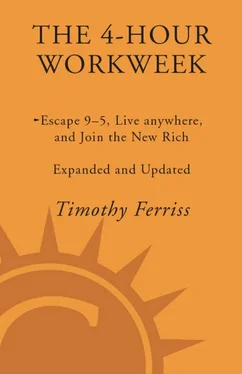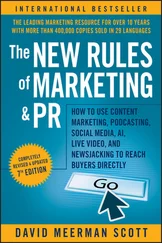Timothy Ferriss - The 4-Hour Workweek - Escape 9–5, Live Anywhere, and Join the New Rich - Expanded and Updated
Здесь есть возможность читать онлайн «Timothy Ferriss - The 4-Hour Workweek - Escape 9–5, Live Anywhere, and Join the New Rich - Expanded and Updated» весь текст электронной книги совершенно бесплатно (целиком полную версию без сокращений). В некоторых случаях можно слушать аудио, скачать через торрент в формате fb2 и присутствует краткое содержание. Жанр: Прочая научная литература, на английском языке. Описание произведения, (предисловие) а так же отзывы посетителей доступны на портале библиотеки ЛибКат.
- Название:The 4-Hour Workweek: Escape 9–5, Live Anywhere, and Join the New Rich - Expanded and Updated
- Автор:
- Жанр:
- Год:неизвестен
- ISBN:нет данных
- Рейтинг книги:3 / 5. Голосов: 1
-
Избранное:Добавить в избранное
- Отзывы:
-
Ваша оценка:
- 60
- 1
- 2
- 3
- 4
- 5
The 4-Hour Workweek: Escape 9–5, Live Anywhere, and Join the New Rich - Expanded and Updated: краткое содержание, описание и аннотация
Предлагаем к чтению аннотацию, описание, краткое содержание или предисловие (зависит от того, что написал сам автор книги «The 4-Hour Workweek: Escape 9–5, Live Anywhere, and Join the New Rich - Expanded and Updated»). Если вы не нашли необходимую информацию о книге — напишите в комментариях, мы постараемся отыскать её.
The 4-Hour Workweek: Escape 9–5, Live Anywhere, and Join the New Rich - Expanded and Updated — читать онлайн бесплатно полную книгу (весь текст) целиком
Ниже представлен текст книги, разбитый по страницам. Система сохранения места последней прочитанной страницы, позволяет с удобством читать онлайн бесплатно книгу «The 4-Hour Workweek: Escape 9–5, Live Anywhere, and Join the New Rich - Expanded and Updated», без необходимости каждый раз заново искать на чём Вы остановились. Поставьте закладку, и сможете в любой момент перейти на страницу, на которой закончили чтение.
Интервал:
Закладка:
At least three times per day at scheduled times, he had to ask himself the following question:
Am I being productive or just active?
Charney captured the essence of this with less-abstract wording:
Am I inventing things to do to avoid the important?
He eliminated all of the activities he used as crutches and began to focus on demonstrating results instead of showing dedication. Dedication is often just meaningless work in disguise. Be ruthless and cut the fat.
It is possible to have your cupcake and eat it, too.
Q&A: QUESTIONS AND ACTIONS
We create stress for ourselves because you feel like you have to do it. You have to. I don’t feel that anymore.
—OPRAH WINFREY, actress and talk-show host, The Oprah Winfrey Show
The key to having more time is doing less, and there are two paths to getting there, both of which should be used together: (1) Define a to-do list and (2) define a not-to-do list. In general terms, there are but two questions:
What 20% of sources are causing 80% of my problems and unhappiness?
What 20% of sources are resulting in 80% of my desired outcome and happiness?
Hypothetical cases help to get us started:
1. If you had a heart attack and had to work two hours per day, what would you do?
Not five hours, not four hours, not three—two hours. It’s not where I want you to ultimately be, but it’s a start. Besides, I can hear your brain bubbling already: That’s ridiculous. Impossible! I know, I know. If I told you that you could survive for months, functioning quite well, on four hours of sleep per night, would you believe me? Probably not. Notwithstanding, millions of new mothers do it all the time. This exercise is not optional. The doctor has warned you, after triple-bypass surgery, that if you don’t cut down your work to two hours per day for the first three months post-op, you will die. How would you do it?
2. If you had a second heart attack and had to work two hours per week , what would you do?
3. If you had a gun to your head and had to stop doing 4/5 of different time-consuming activities, what would you remove?Simplicity requires ruthlessness. If you had to stop  of time-consuming activities—e-mail, phone calls, conversations, paperwork, meetings, advertising, customers, suppliers, products, services, etc.—what would you eliminate to keep the negative effect on income to a minimum? Used even once per month, this question alone can keep you sane and on track.
of time-consuming activities—e-mail, phone calls, conversations, paperwork, meetings, advertising, customers, suppliers, products, services, etc.—what would you eliminate to keep the negative effect on income to a minimum? Used even once per month, this question alone can keep you sane and on track.
4. What are the top-three activities that I use to fill time to feel as though I’ve been productive?
These are usually used to postpone more important actions (often uncomfortable because there is a chance of failure or rejection). Be honest with yourself, as we all do this on occasion. What are your crutch activities?
5. Who are the 20% of people who produce 80% of your enjoyment and propel you forward, and which 20% cause 80% of your depression, anger, and second-guessing?
Identify:
Positive friends versus time-consuming friends: Who is helping versus hurting you, and how do you increase your time with the former while decreasing or eliminating your time with the latter?
Who is causing me stress disproportionate to the time I spend with them? What will happen if I simply stop interacting with these people? Fear-setting helps here.
When do I feel starved for time? What commitments, thoughts, and people can I eliminate to fix this problem?
Exact numbers aren’t needed to realize that we spend too much time with those who poison us with pessimism, sloth, and low expectations of themselves and the world. It is often the case that you have to fire certain friends or retire from particular social circles to have the life you want. This isn’t being mean; it is being practical. Poisonous people do not deserve your time. To think otherwise is masochistic.
The best way to approach a potential break is simple: Confide in them honestly but tactfully and explain your concerns. If they bite back, your conclusions have been confirmed. Drop them like any other bad habit. If they promise to change, first spend at least two weeks apart to develop other positive influences in your life and diminish psychological dependency. The next trial period should have a set duration and consist of pass-or-fail criteria.
If this approach is too confrontational for you, just politely refuse to interact with them. Be in the middle of something when the call comes, and have a prior commitment when the invitation to hang out comes. Once you see the benefits of decreased time with these people, it will be easier to stop communication altogether.
I’m not going to lie: It sucks. It hurts like pulling out a splinter. But you are the average of the five people you associate with most, so do not underestimate the effects of your pessimistic, unambitious, or disorganized friends. If someone isn’t making you stronger, they’re making you weaker.
Remove the splinters and you’ll thank yourself for it.
6. Learn to ask, “If this is the only thing I accomplish today, will I be satisfied with my day?”
Don’t ever arrive at the office or in front of your computer without a clear list of priorities. You’ll just read unassociated e-mail and scramble your brain for the day. Compile your to-do list for tomorrow no later than this evening. I don’t recommend using Outlook or computerized to-do lists, because it is possible to add an infinite number of items. I use a standard piece of paper folded in half three times, which fits perfectly in the pocket and limits you to noting only a few items.
There should never be more than two mission-critical items to complete each day. Never. It just isn’t necessary if they’re actually high-impact. If you are stuck trying to decide between multiple items that all seem crucial, as happens to all of us, look at each in turn and ask yourself, If this is the only thing I accomplish today, will I be satisfied with my day?
To counter the seemingly urgent, ask yourself: What will happen if I don’t do this, and is it worth putting off the important to do it? If you haven’t already accomplished at least one important task in the day, don’t spend the last business hour returning a DVD to avoid a $5 late charge. Get the important task done and pay the $5 fine.
7. Put a Post-it on your computer screen or set an Outlook reminder to alert you at least three times daily with the question: Are you inventing things to do to avoid the important?
I also use free time-tracking software called RescueTime (www.rescuetime.com) to alert me when I spend more than an allotted time on certain websites or programs often used to avoid the important (Gmail, Facebook, Outlook, etc.). It also summarizes your time use each week and compares your performance to peers.
8. Do not multitask.
I’m going to tell you what you already know. Trying to brush your teeth, talk on the phone, and answer e-mail at the same time just doesn’t work. Eating while doing online research and instant messaging? Ditto.
If you prioritize properly, there is no need to multitask. It is a symptom of “task creep”—doing more to feel productive while actually accomplishing less. As stated, you should have, at most, two primary goals or tasks per day. Do them separately from start to finish without distraction. Divided attention will result in more frequent interruptions, lapses in concentration, poorer net results, and less gratification.
9. Use Parkinson’s Law on a Macro and Micro Level.
Читать дальшеИнтервал:
Закладка:
Похожие книги на «The 4-Hour Workweek: Escape 9–5, Live Anywhere, and Join the New Rich - Expanded and Updated»
Представляем Вашему вниманию похожие книги на «The 4-Hour Workweek: Escape 9–5, Live Anywhere, and Join the New Rich - Expanded and Updated» списком для выбора. Мы отобрали схожую по названию и смыслу литературу в надежде предоставить читателям больше вариантов отыскать новые, интересные, ещё непрочитанные произведения.
Обсуждение, отзывы о книге «The 4-Hour Workweek: Escape 9–5, Live Anywhere, and Join the New Rich - Expanded and Updated» и просто собственные мнения читателей. Оставьте ваши комментарии, напишите, что Вы думаете о произведении, его смысле или главных героях. Укажите что конкретно понравилось, а что нет, и почему Вы так считаете.












